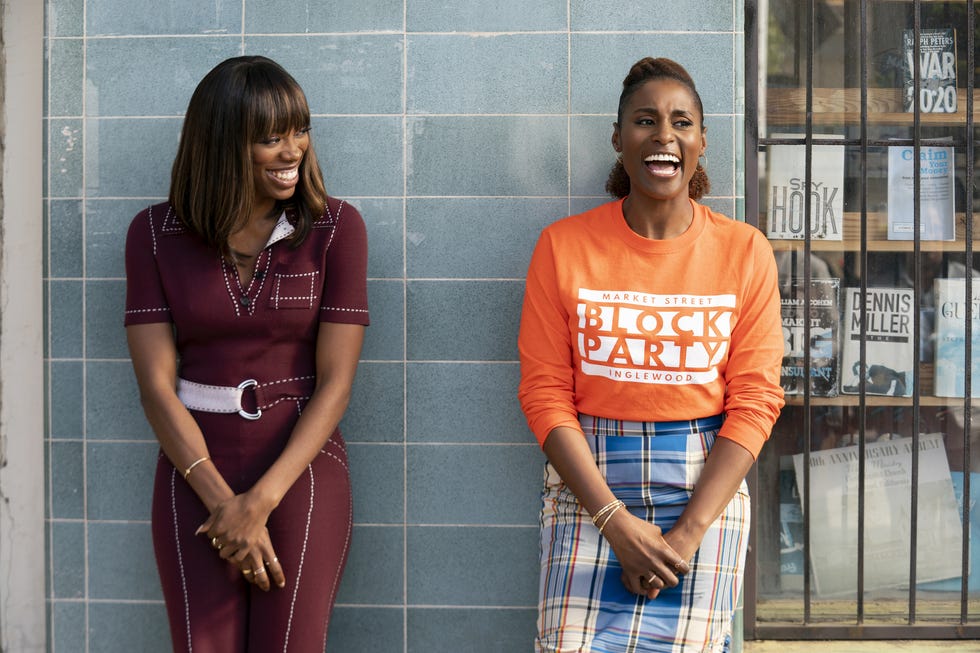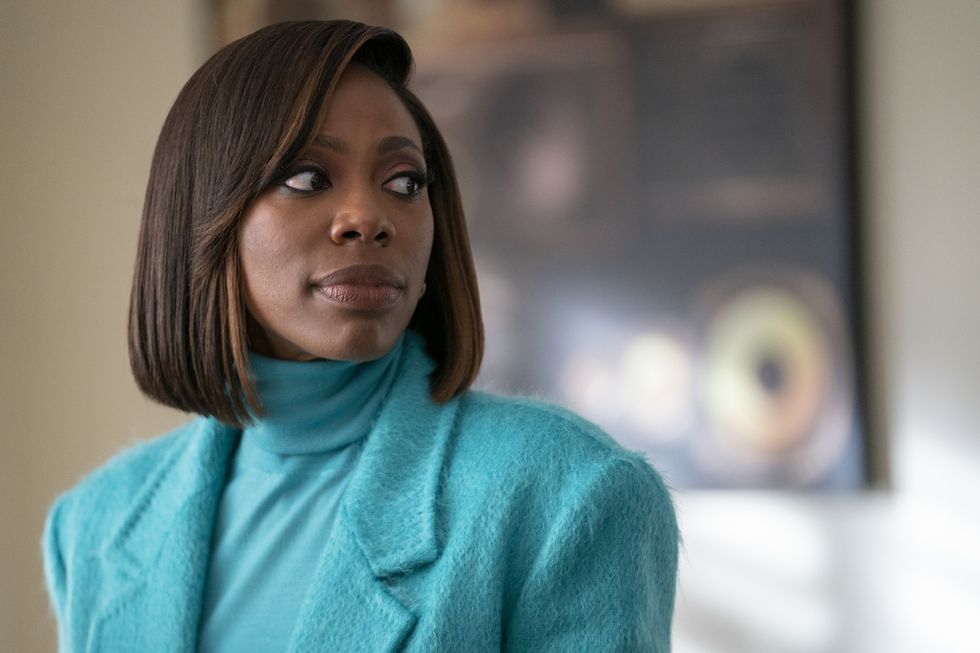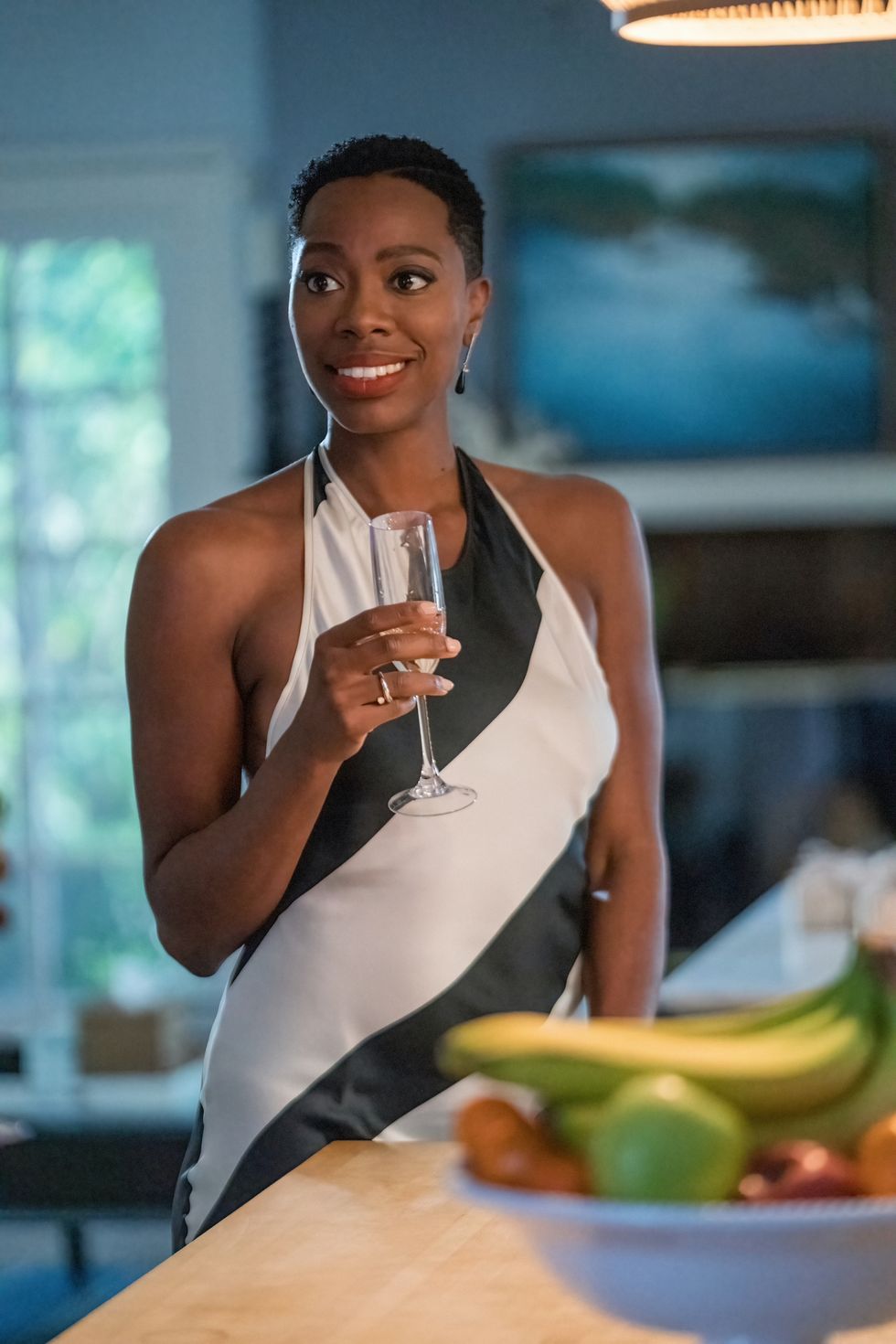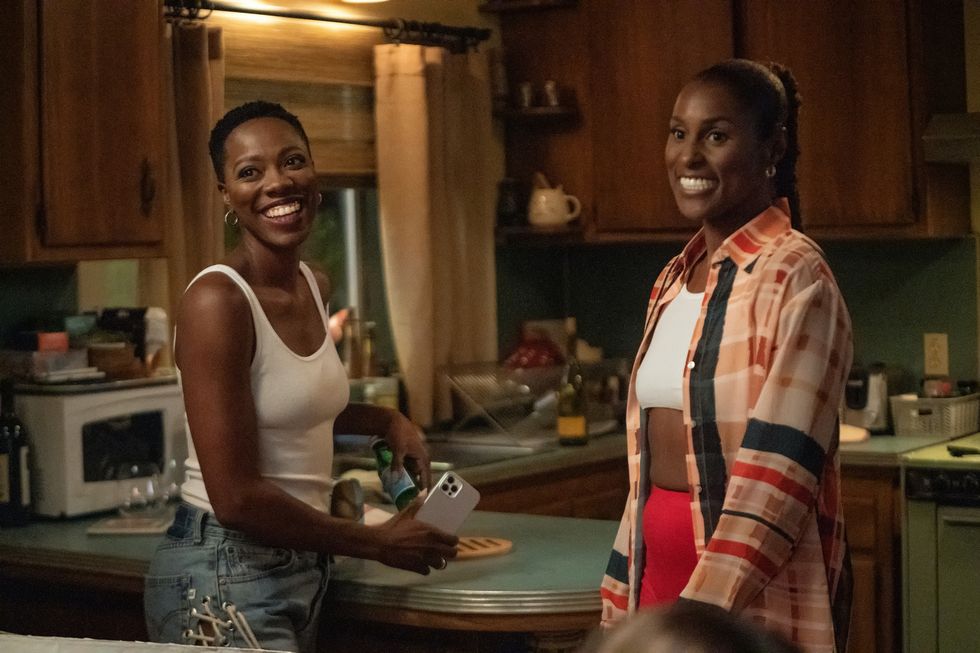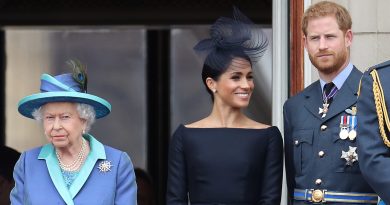It Took Therapy to Realize That I’m Way More Like Molly on Insecure That I Thought
“Honestly, I don’t fuck with Molly anymore,” were Issa’s foreshadowing words just three minutes into the plot-busting Blocc Party episode of Insecure season 4. What ensued just moments later was one of the most dramatic, public bestie-breakups in the history of television. For seasons, the friction between on-screen BFFLs, Issa and Molly had been brewing, but the tensions reached critical mass when Issa went behind Molly’s back to ask her then boyfriend, Andrew, for help securing Vince Staples for her event. When Molly found out, all hell broke loose, and what should’ve been a celebratory moment crowning years of Issa’s hustle morphed into a finger-wagging, close-faced, verbal knock-out between friends. It’s safe to say that Molly’s character on Insecure was the least-likely-to-be-picked-as-fan-favorite for all five seasons the show aired. Molly, the gorgeously ambitious, confident, lawyer-bae, and Issa’s ride-or-die, was at the center of many post-episode Black Twitter (RIP) wars. Scanning fan Reddit threads alone, the topics titled, “Am I the only one who thinks Molly was insufferable more than not,” “Molly was really exhausting,” “Molly is the worst,” and my favorite, “Molly is really miserable,” paint a general picture of fan vitriol aimed at the complicated character. I, too, road the bandwagon of #TeamIssa as well, and I confidently pitted myself against Molly in every online debate, boozy brunch gossip sesh with the girls, and water-cooler Slack conversation with colleagues, until…I went to therapy. With fresh eyes, I dared to re-watch the series from a healing girl perspective, and was surprised to find deep parity with Molly that ultimately helped me see and empathize with my own beautifully complex journey more.
When Insecure debuted in the fall of 2016, the series revolutionized television as HBO’s first show created by and starring a Black woman. For those of us who were die-hard fans of HBO’s iconic Sex and the City series, to have a Black woman at the helm of a new, sexy, coming-of-age, TV tale of 30-somethings was a game-changer. No one on premium cable had told the story of us before as main characters, not sidekicks, and as such, I felt called to revisit the entire series two years after production shuttered in the same way a curator might inspect fine art from the Renaissance period. However, what I was surprised to find between the lines of dialogue was more of myself. It’s hard to admit that my pre-therapy personality confronted the world and some of the people closest to me with the same hard-assness that Molly’s character was notorious for. Like Molly, many periods in my past have been marked by intense moments where my ambition and hyper-independent trauma response streaks caused professional and relational rifts. Therapy finally gave me the safe space to acknowledge years of unaddressed personal and professional trauma that left me depressed and emotionally unavailable.
Like me, Molly reluctantly began therapy at the start of season 2, and while we never hear her therapist formally diagnose her with any sort of mental health condition, I can hypothesize that Molly’s character arc was inspired by the real-life woes of Black women in corporate. Despite an uptick in DEI initiatives across the country over the last few years, 66 percent of Black women report they don’t feel emotionally safe at work, and 67 percent don’t believe their job performance is evaluated fairly, according to a 2022 report compiled by Black Women Thrive. We see this play out on the show, when Molly accidentally receives the paycheck of a white male co-worker who was paid more than her for significantly less work. Along with managing micro-aggressions and unfair pay, Black women in corporate are doubly taxed by an expectation that they must financially and emotionally carry their family and friends on their back, too. The toll of these stressors adds up, and unfortunately, with so few safety nets to catch Black women if they can’t perform, many are forced to push through the pain. And that’s where we slip through the cracks. “Black women constantly navigate racism, systemic and interpersonal, in addition to sexism and a special blend of misogynoir. These barriers, in addition to the ongoing challenges of daily life, can contribute to depressive episodes,” Davia Roberts, a Washington, D.C.-based licensed professional counselor and executive director of CarrierBradley Agency told Fortune.
Depression can show up more discreetly in Black women than it does in our peers. According to a 2022 study published in Nursing Research, depression in Black women can manifest as irritability, insomnia, self-criticism, and self-hate, versus depressed mood, which can lead to underdiagnosis and undertreatment. So there is an inherent empathy gap between what it looks like to be a high-achieving Black woman, and what it actually feels like, and that dehumanization is where I think we find ourselves pitted against Molly. Because there is some part of us that wants to believe that the woman who looks like she has it all together isn’t suffering, but the truth is, invisible wounds still burn hot. Especially for dark skin women, who statistically experience more racism in the workplace than their lighter skin counterparts. There are Mollys all around us who deserve care and empathy, but no one comes to save her, because she looks good while in pain. And I’m no longer afraid to say, I was that girl.
“We all deserve grace, especially the people who’ve had to be ‘the together ones’ in the family and the group,” Bea Arthur, psychotherapist and founder of The Difference told ELLE. Bea and I re-watched the Blocc Party episode together, and she weighed in on how Molly and Issa’s fictional dynamic plays out in real life between friends—especially when relationship dynamics start to change over time. “There might be some codependency, but that codependency was based on their old dynamic, which was successful big sister, fuck-up little sister,” Arthur said. As Molly progressed in her therapy journey, it became clear that the unspoken relationship contract between her and Issa wore out fast, breeding resentment. In order to navigate the rocky terrain of building a new friendship, old friends have to be willing to have difficult discussions about what they can give, and no longer give, as their new selves. “We are allowed to say, ‘Well, guess what? I don’t want to have to take care of everybody else,’” Arthur explained. She said that this level of honesty is inherently a “messy” conversation because people fall in love with you showing up one way, and now must adjust to a new version of you, or make the decision to part ways.
Relationship breakups are one thing, but breaking up with a fantasized idea of what life “should be” like is another. On season 2, episode 2, we see Molly getting more comfortable with her therapist after an initial patch of resistance (relatable content). While venting about being lowballed at work, Molly’s therapist points out a pattern, “You frame a lot of things in your life with should, have you ever noticed that?” to which Molly replied, “No,” but then her therapist continued, “Two weeks ago, you said, ‘Things should be easier for me as a successful Black woman’ and another time you said, ‘Things should have fallen into place by now.’ Is there a certain way you think your life should go?”
I remember when I first heard that question, my heart sunk into the pit of my stomach. I felt queasy, and everything about my own world suddenly felt insecure. In retrospect, I understand why. It’s because somewhere in my heart, I already knew the winds of change were hurling towards me, and I was afraid to grieve my “shoulds” because it meant the end of life as I knew it. Just a few years after watching that scene, I’ve had to part ways with so many aspects of what I thought life should look like in order to welcome in a healthier version of myself. I ended relationships that spanned decades in order to advocate for my own emotional and physical safety. I suffered through tough conversations with family members detailing childhood trauma that was repressed in my psyche my whole life. I had to adjust my social life to focus more on daytime activities over nightlife. I had to embrace my extremely introverted side, and stop performing happy and approachable for everyone in order to feel loved. I had to say goodbye to a city I thought I’d live in forever, finally accepting that my soft heart wasn’t built for the rough, fast, lifestyle anymore. Needless to say, none of this is how I thought life should go. The cost has been greater and more painful than anyone will ever know or believe. But it’s helped me, for the first time, to live for me, and that’s priceless.
The cruel reality of growth is that no one is obligated to stay along for the ride. Healthy, life-long relationships are not for the faint of heart, and we have to accept that real healing journeys are often marred by bouts of bitchiness, defensiveness, confusing sexual encounters, tense romantic relationships, and at times, coldness and isolation from friends and family who love you. Watching Molly navigate through all those stages (broken pussy to wifey) and still find the happiness she was looking for, helped me find deeper compassion for my own journey back to my true self. That’s why authentic Black womanhood being represented on screen will always be important to culture, because sometimes we grow up with television, other times, television encourages us to grow.
Keyaira Kelly is a writer, editor, and poet based in New York & Los Angeles. Her work lives and breathes at the intersection of pop culture and wellness. She formerly served as Health Editor at Business Insider, with bylines scattered across the web for other outlets including ESSENCE, HelloBeautiful, The Grio, and The World Economic Forum. She prefers her wee dog and sci-fi books over people most days, unless someone’s throwing a really good party. Follow her incense trail @keyairakelly on IG.


